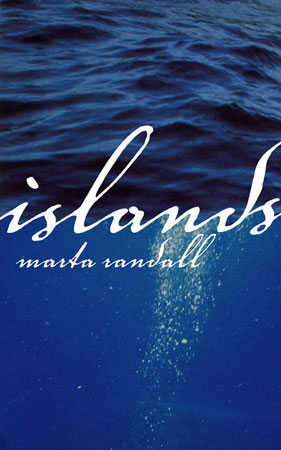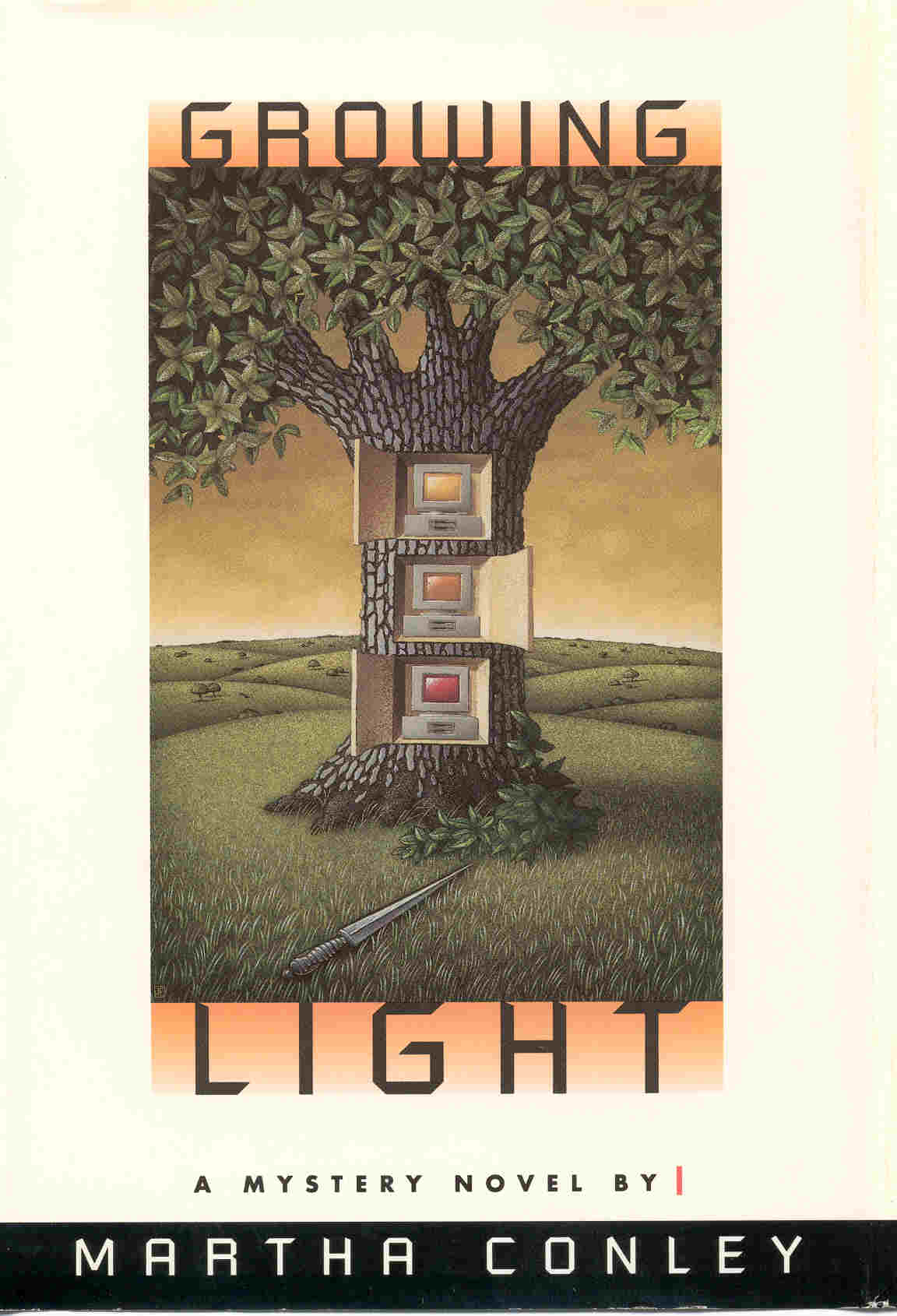Islands
Journey
Growing Light
home
contact
|

Read
the opening
|
Islands
Joseph Minion, Amazon.com
Reading this book is like
plugging directly into your soul. You can't help but be hooked by the premise
of a single human mortal (the novel's narrator, Tia) in a future world
in which death has been conquered by science. The central guiding conceit
is a beautifully simple, perfectly analogous metaphor for the universal
experience of alienation -- of alienation to a horrifying degree:
how can everyone else in the world not seem to be preoccupied with
relatively petty concerns when you are the only one that will one
day die? I have never felt such rock-bottom, hardcore aspects of human
experience like death, sex, man's existential aloneness, transcendence
(from...? to...?), art, passion for life, ostracism, even the futility
of belief in God for those who are cursed with a steely intellect, forefronted
and wrestled with so exhaustively, passionately AND entertainingly(!) in
one novel. The writing seems to be the product not only of a tireless wordsmith,
but feels so specific in its many beautifully woven technical descriptions
that you'd be surprised if the author did not have a degree in engineering,
besides an impressive working knowledge of architecture, botany, physiology
and marine biology (besides a Tom Wolfeian talent for evoking hallucinatory
drug experiences to boot).
But first and foremost, this
is a work of literature. It is, unapologetically, science fiction, and
it is also front rank literary art, doing the work that literature does,
going right for matters of the human soul, wondering, questioning -- in
as galvanizing a way that this reader can conjecture by virtue of the fact
that all the novel's readers will share with Tia the one thing that makes
her a "freak" -- what we are all doing here, the ultimate question of any
art form.
Randall creates a world that
is vivid and consistent, just strange enough to remind you, on every page,
that we are in a future world, but always human enough to keep the reader
from drifting off into some fantasy that is not terribly, terribly urgent
from word one.
Interestingly, there are
people all over the country now, so confused and distracted by the chaos
of our culture, who are going on "retreats" that contain as their central
theme "A Year to Live", the point being to force the retreatant to take
stock of what's truly important in their life and (I imagine) begin
to prioritize. A couple of pages into Marta Randall's "Islands" and, seeing
the world through her narrator's eyes, you're right there, face to face
with The Thing That Makes You...Prioritize! |

Read
the opening
|
Journey
Library Journal
Many works of sf deal with
approaches to new worlds. In some, the approach is confrontation or conquest;
in others a political or sociological world-building takes place; in Journey
we see not only the building of a society but the creation of a community,
a haven, a home. This unusual tale is enriched by its science fictional
trappings - a gentle alien race wins the friendship of suspicious humans;
an exploding supernova signals the ending of one world and true commitment
to a new one; a child grows to manhood and fulfills his dream of becoming
a space adventurer; women not only bear children but fill important societal
roles - but these well-drawn elements do not distract from what is essentially
a family saga, a story not only of building a home but of homecoming. Highly
recommended.
Charles N. Brown, Isaac
Asimov’s Science Fiction Magazine
Marta Randall has taken
the popular, family-saga-type novel and turned it into a major piece of
science fiction. Journey is the story of both a family, the Kennerins,
and a frontier world, Aerie. It covers about 20 years in their lives. The
characterizations are marvelous. Randall has created real, sympathetic
people and told their story, their triumphs and failures - both physical
and emotional - with skill and understanding. Even the minor characters
come alive. The book is extremely long but never dull. I made the mistake
of starring it late one night and found myself unable to stop in the middle...
This is the best original novel I’ve read so far this year. Highly recommended.
Spider Robinson, Destinies
1
Another newcomer worth your
investment is Marta Randall. Journey is her second novel, and a damned
impressive one it is. It is a science fiction family saga, a kind of space/soap
opera - but so, come to think of it, was Dune or Foundation or The Rolling
Stones. Randall creates a whole family as her protagonist, over a span
of four generations, and nearly all the family members get a turn at being
the viewpoint character. Each and every one of the characters is rounded,
engaging, and warmly real, whether seen in the first or third person, and
the intricate windings of their karma provided a story that held my interest
throughout. I cared about those people, one and all, and still do.
Randall’s prose is more than
readable, more than competent. It is polished, measured, rich in color
and emotion yet never overindulgent, economically evocative. Somehow or
other, she has created a 324-page book without an ounce of fat on it anywhere,
an enormous and sprawling - yet perfectly controlled - saga. John Jakes
isn’t in her league...
Journey is startlingly good,
and I look forward to more books from Marta Randall. |

Read
the opening
Written as Martha Conley
| A limited number of autographed hardcovers are available
from the author for US$25.00, plus $3.00 shipping & handling. Email
Marta for details. |
|
Growing Light
West Coast Review of Books
Growing Light's originality
and overtones of sheer fun will keep you in stitches page after page. It's
a must read for those who don't take life - or murder - too seriously.
Publishers Weekly
A spirited debut [that]
mines California's New Age culture for comedy, romance, and puzzling murder.
Kirkus Reviews
Bright and funny - a welcome
debut.
Fred Burke, Burke's
Bookshelf
I defy anyone to find more
entertainment for his or her dollar than in Growing Light, the debut mystery
from Martha Conley. Conley's take on Northern California is dead-on, and
her setting – a New Age computer company – enables her to skewer two sacred
cows with one banderilla. Growing Light proves that cynical laughter and
murder are an intoxicating combination.
Anne Munro is Conley's sweetly
courageous heroine, entering the job force as a technical writer at Growing
Light, whose gardening software integrates weather patterns, sunlight,
temperature range, and the gardener's astrological information info to
"attune" garden and gardener in perfect bio-synch. The brainchild of George
Ashby, Growing Light reflects the Haight-Ashbury side of his personal,
a daft cover for the heartless cruelty with which he runs his personal
life.
That life doesn't last long,
and just about everyone could be the killer. But who?
As simply pleasing as the
plot synopsis sounds, the actual ins and outs of the crazy workforce at
Growing Light provide a pell-mell river of fun twists – and the ending
is rewardingly unexpected.
Which brings us to the best
part of mystery novels: in this genre, when a captivating writer gives
us a fun heroine and a rich setting, we are almost always blessed with
a sequel. I'll be waiting.
Richard A. Lupoff
Martha Conley writes with
a deceptive sweetness and gentility. In fact, her barbed arrows at the
Northern California culture of high technology, New Age hooey-woowie, and
covertly cold-blooded materialism strike to the very center of the bull's
eye. Anne Munro's dogged courage unravels a murder mystery of almost Ross
Macdonald-like complexity and leads to a wholly satisfying and valid solution.
In Growing Light, Martha
Conley and Anne Munro make a most happy debut. I hope to see them back
in many more adventures.
Charles de Lint
It's not just that Conley
has created such a warm and believable chracter in her protagonist, Anne
Munro, although Lord knows that's a gift that shouldn't be overlooked.
What makes Growing Light such a delicious read is how Conley juxtaposes
Munro's normality so effectively against hte loopy cast of feel-good, New
Age-conscious Californias with whom she has come under suspicion for the
murder of her new boss. Scenes like the one with the Berkeley programmer
and hilarious, but Conley balances the humor with a true understanding
of the serious side of human nature as well. A wonderful debut. |

Read
the opening |
Dangerous
Games
Stephen
King
DANGEROUS
GAMES is wonderful. Although I liked just about everything about it, the
thing I liked the best, I think, was the book's leisurely pace and the
sheer expanse of the thing. In fact, that took me a little while to get
used to, because a great deal of science fiction (I don't read much SF
anymore; it's gotten too technical and too linguistically introspective
– to the point where it seems that half the words on any given page are
unfamiliar collections of consonants in italics) seems very jittery to
me, very much in a hurry, very much POW! BAM! And on to the next panel.
I like the book's muscularity and its interest in family affairs and family
ties. I liked the fact that the women were strong but the men seemed to
be presented fairly. I loved Chiba and his hot-air balloon, and the kasirene
were great. I'd like to see a picture of them; I keep imagining intelligent
kangaroos observed in 3-D without the glasses. I'm sure that must all be
wrong.
Don
D'Ammassa, S.F. Chronicle
Marta
Randall is one of those writers who just goes right along getting better
with each novel. Journey was so much better than her first couple of novels
that it seemed like another writer entirely. Now, with a very long sequel
to that novel, she has created one of the finer novels to appear in years.
Randall
does a fine job with her characters, as usual, and the early chapters in
particular present a fascinating interplay among the crew of a starship.
She has also created a fascinating personality in Tatha, the cat woman,
who is a pivotal element in the plot against the Kennerins.
Dangerous
Games is a mixture of science fiction and historical novel that may put
some readers off. Randall doesn't rush headlong int her plot, but carefully
considers each step before she proceeds. But it is that very cautiousness
which makes the novel so effective, an approach many another writer would
do well to imitate.
Analog
Marta
Randall's Dangerous Games is a more standard brand of SF. Its universe
is one whose people range among the stars, where worlds are owned by corporations
and families, where corporate takeovers can mean literal interstellar war.
In this cosmos, we have Sandro Marquez, scion of a clan whose world has
been lost to Parallax, a greedy giant of a company that tyrannizes its
possessions. He blames the loss in part on the Kennerins, a directly competing
family; yet he is soon allied with them, mate on a starship and peripheral
witness to the events surrounding them. He is there when Jes Kennerin acquires
the cat-woman Tatha and her babe from Gensco Station, an outfit that guarantees
its employees' loyalty by such tactics as holding their children as hostages.
He is there when the Kennerin's own genetic engineer, Hart, is punished
for his early, clumsy experiments on the natives of the Kennerin world.
And he is there to help when Parallax aims a takeover bid at Aerie.
Part
of the book has appeared as an F&SF novelet. It stands out, too, for
even though the book is organized episodically, it is pervaded by a sense
of family ties that here fades a way, or at least takes a different, more
personal focus. Yet it hardly spoils the book. The story as a whole is
strong enough to withstand such a weakening, and it remains a book worth
reading. |
|